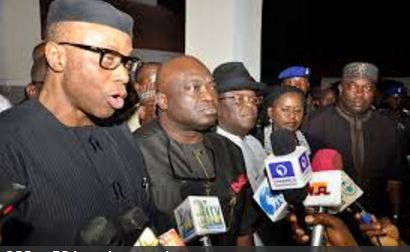Indications emerged that the Economic and Financial Crimes Commission (EFCC) have invited former Finance and coordinating Minister of the economy under the Goodluck Jonathan administration, Mrs. Ngozi Okonjo-Iweala to explain how $250million of the $500million recovered from the family of the late Head of State, Gen.Sani Abacha, was withdrawn.
According to a report by The Nation, the cash was released to the Office of National Security Adviser(ONSA) without appropriation.
About $36,155,000 (N13,015,800 billion) out of the $250million was also withdrawn in cash “without any purpose” on March 2nd, 9th, 16th and 18th of 2015.
The Acting Chairman of Economic and Financial Crimes Commission (EFCC), Ibrahim Magu, has approved Okonjo-Iweala’s invitation. A letter of invitation has been sent to her.
According to a fact-sheet obtained last night, detectives probing the whereabouts of the $500million have recommended that the ex-minister be interrogated.
A top source within the agency said: “Following preliminary findings, a strong recommendation was made to the Acting EFCC chairman for an interactive session with Dr. Ngozi Okonjo-Iweala.
“Magu has approved the invitation of the ex-minister. We have dispatched a letter of invitation to her. We are hopeful that she will respond.
“Her presence is necessary because there were issues about the $250million released especially why $36,155,000(N13,015,800billion) was withdrawn in cash.
“She needs to assist the EFCC team on what became of the balance of $250million which was yet to be traced.
“She has to explain why some of the funds were diverted to extraneous matters including media services, opinion polls and personal matters.”
In another position of the fact-sheet, the Office of the National Security Adviser in a memo on January 12, 2015, requested the former Coordinating Minister for the Economy and Minister of Finance, Dr. Ngozi Okonjo-Iweala to transfer $300million.
The memo said: “Please refer to our meeting on recovered funds. You are please requested to remit the sum of $300m and £5.5m to the following account being ONSA share as agreed.
In response, Okonjo-Iweala via a memo to ex-President Goodluck Jonathan requested for the release of $300m from Abacha loot to the former National Security Adviser(NSA).
But only $250million was released to the ex-NSA.
The memo explained that this is to enable the NSA’s office to purchase ammunition, security and other intelligence equipment for the security agencies in order to enable them confront the ongoing Boko Haram threat.
“This request is sequel to the meeting you chaired with the committee on use of recovered funds where decision was made that recovered Abacha funds would be split 50-50 between urgent security needs to confront Boko Haram and development needs (including a portion for the Future Generations window of Sovereign Wealth Fund).
“This letter is to seek your approval to borrow these funds, for now, to disburse to the NSA. These funds form part of projected FG Independent Revenue to be appropriated.
“In light of this and for accountability, given the peculiar nature of security and intelligence transactions, we would expect the NSA to account to your Excellency for the utilization of the funds.”
On January 29, 2015, the ex-President responded to the ex-Minister as follows: “CME/HMF, approved.”
But Okonjo-Iweala had in 2015 insisted that she had no case to answer.
She said: Former President Jonathan set up a Committee comprising of the former Minister of Justice, former NSA and the former Minister of Finance to determine how best to use both the returned and expected funds for development.
- The NSA made a case for using the returned funds for urgent security operations since, he noted, there cannot be any development without peace and security. Based on this, a decision was taken to deploy about $322m for the military operations, while the expected $700m would be applied for development programmes as originally conceived.
- Following the discussions and based on the urgency of the NSA’s memo, Dr Okonjo-Iweala requested the President to approve the transfer of the requested amount to the NSA’s Office for the specified purposes.
- But, as captured in the memo, she insisted on three conditions: a. only a part, not the entire Abacha funds would be spent on the arms; the rest would be invested in developmental projects as originally conceived b. the money was to be treated as borrowed funds which would be paid back as soon as possible c. the NSA’s office was to account for the spending to the President who was the Commander in Chief, given the fact that the Minister of Finance is not part of the security architecture and does not participate in the Security Council.
- The attempt to link the former Minister’s name to any misuse of these funds for any purpose other than security as far as she understood it is totally false and cannot stand.”
A former Chairman of the EFCC, Mallam Nuhu Ribadu had claimed that Abacha “took over $6 billion from Nigeria.” He also said $2 billion was recovered when he was in charge of the anti-graft agency.


